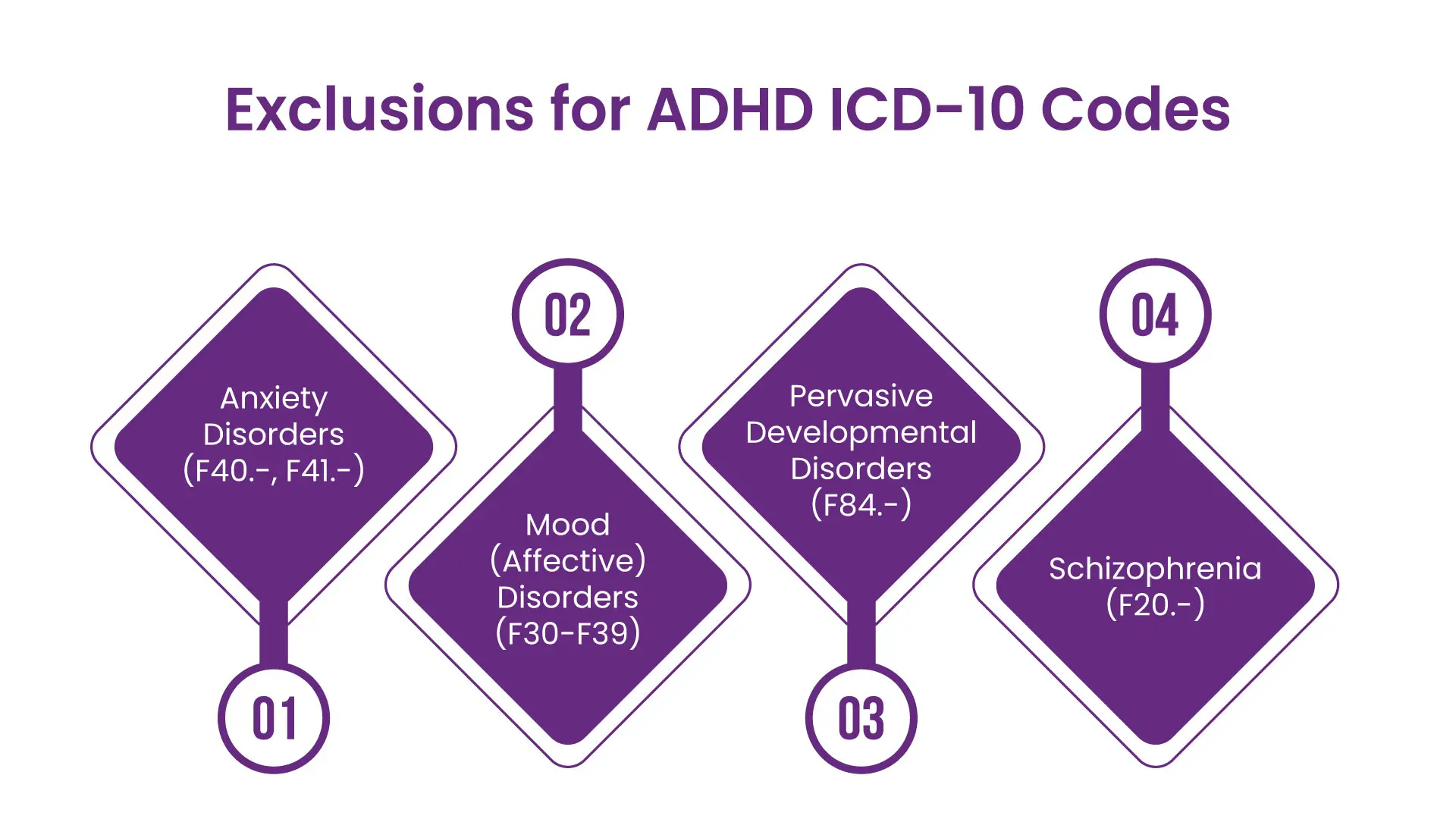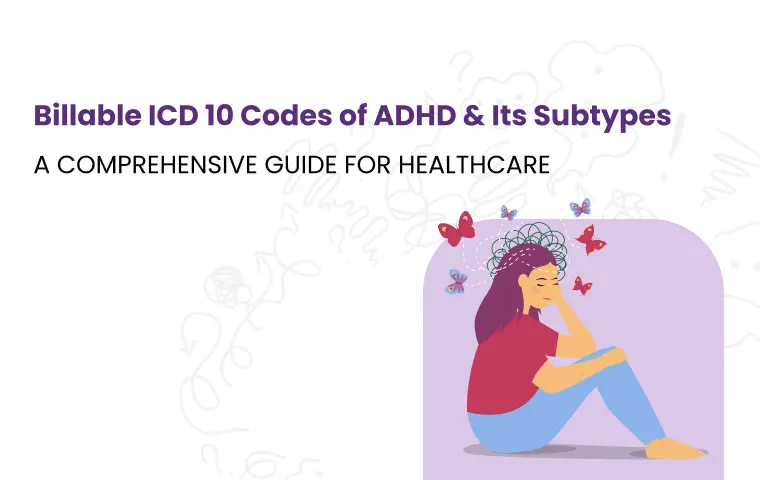Attention Deficit Hyperactivity Disorder (ADHD) profoundly affects millions of lives, and healthcare providers like you are continuously working to help people manage this complex condition. However, when it comes to ensuring proper reimbursement for your services, accurate documentation using specific ICD-10 codes is crucial. Many healthcare providers unintentionally miscode ADHD and its related conditions, leading to claim denials and lost revenue.
Are you familiar with the specific ICD-10 codes for ADHD and its different presentations? Understanding these codes is essential for accurate diagnosis and treatment planning and for ensuring that your practice receives the appropriate reimbursement for the valuable care you provide to individuals with ADHD.
What is the Billable ICD 10 Code for ADHD?
While the general ICD-10 code F90 is often used to broadly categorize Attention Deficit Hyperactivity Disorder (ADHD), it's essential to be aware that this category encompasses several distinct subtypes. For accurate diagnosis, treatment planning, and reimbursement, it is strongly recommended to utilize more specific codes within the F90 category that reflect the individual's particular presentation of ADHD.
ICD 10 Codes for ADHD Types
While the general code F90 may be tempting for its simplicity, using more specific codes within the F90 category paints a more precise clinical picture of your patient's unique challenges. This, in turn, guides more tailored treatment plans and supports your case for specific interventions and therapies.
F90.0: Attention-Deficit Hyperactivity Disorder, Predominantly Inattentive Type
Clinical Presentation: Patients struggle primarily with inattention, distractibility, disorganization, and forgetfulness. They may appear dreamy or lost in thought but don't typically display hyperactivity.
Provider Implications: This subtype is often overlooked or misdiagnosed as anxiety or depression. Recognizing the core features of inattention is crucial for early intervention and appropriate treatment, such as non-stimulant medications and behavioral therapies targeting executive functioning skills.
F90.1: Attention-Deficit Hyperactivity Disorder, Predominantly Hyperactive-Impulsive Type
Clinical Presentation: Patients exhibit excessive fidgeting, restlessness, impulsivity, and difficulty waiting their turn. While some inattention may be present, hyperactive and impulsive behaviors dominate the clinical picture.
Provider Implications: Accurate diagnosis is essential to distinguish this subtype from other conditions with similar behavioral manifestations (e.g., oppositional defiant disorder). Treatment often involves stimulant medications and behavioral interventions focused on self-regulation and impulse control.
F90.2: Attention-Deficit Hyperactivity Disorder, Combined Type
Clinical Presentation: Patients exhibit both inattentive and hyperactive-impulsive symptoms, often experiencing the most significant impairment across various settings (school, work, home).
Provider Implications: Combined-type ADHD often necessitates a multimodal treatment approach, including medication, behavioral therapy, and potentially educational or workplace accommodations. Accurate coding justifies the need for comprehensive interventions and supports insurance reimbursement.
F90.8: Attention-Deficit Hyperactivity Disorder, Other Type
Clinical Presentation: Patients present with ADHD symptoms that don't fully align with the other subtypes. This category may encompass milder presentations or unique combinations of symptoms.
Provider Implications: Careful assessment is needed to rule out alternative diagnoses and tailor treatment plans to the individual's specific needs. This code allows for flexibility in documenting less typical presentations.
F90.9: Attention-Deficit Hyperactivity Disorder, Unspecified Type
Clinical Presentation: Insufficient information is available to determine a specific subtype at the time of diagnosis.
Provider Implications: This code should be used sparingly and only as a temporary placeholder. Thorough evaluation is necessary to identify the appropriate subtype and ensure targeted treatment.
Exclusions for ADHD ICD-10 Codes
While the ICD-10 codes F90.0 through F90.9 are specific to Attention Deficit Hyperactivity Disorder (ADHD), there are certain conditions that are excluded from these codes. This means that if a patient has both ADHD and one of these excluded conditions, you'll need to use additional codes to accurately capture the full clinical picture.
The following conditions are explicitly excluded (Excludes2) from the F90 series of ADHD codes:

-
Anxiety Disorders (F40.-, F41.-): This includes generalized anxiety disorder, panic disorder, social anxiety disorder, and specific phobias.
-
Mood (Affective) Disorders (F30-F39): This includes major depressive disorder, bipolar disorder, and dysthymia.
-
Pervasive Developmental Disorders (F84.-): This includes autism spectrum disorder.
-
Schizophrenia (F20): This includes various subtypes of schizophrenia.
Excludes2 doesn't mean these conditions cannot coexist with ADHD. In fact, it's pretty common for individuals with ADHD also to experience anxiety, mood disorders, or other mental health conditions. The exclusion simply indicates that these conditions should be coded separately in addition to the appropriate ADHD code.
Final Words
it goes without saying that selecting the correct diagnosis code is paramount for optimal reimbursement. When it comes to ADHD, accurate documentation using specific ICD-10 codes ensures that your practice receives the appropriate compensation for the valuable care you provide.
Make sure to utilize the right billable code for the specific type of ADHD you are diagnosing, as this will not only reflect the complexity of your patient's unique needs but also ensure you receive the appropriate reimbursement for your services.
ABOUT AUTHOR

John Wick
As a blog writer with years of experience in the healthcare industry, I have got what it takes to write well-researched content that adds value for the audience. I am a curious individual by nature, driven by passion and I translate that into my writings. I aspire to be among the leading content writers in the world.
